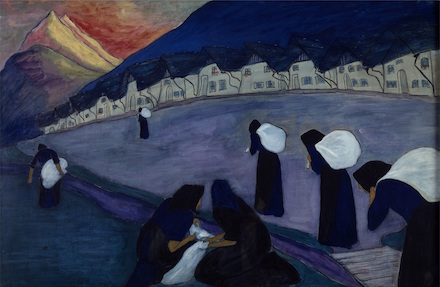
|
|
|
|
|
| Issue 8: | June 2021 |
| Poem: | 367 words [R] |
By Jonathan Yungkans
Women in Black
—after a painting by Marianne von Werefkin*

The women haul sacks across their backs, filled with lives, heavy with bones. It’s easy now to appreciate the distance between themselves, the smell of blood and earth captured in brush strokes on canvas, the bags’ white fabric, the blues which overshadow the painting, definite as the robin’s egg tinge—paper shells across faces at every turn—contagion for which Werefkin might have never had a clue. Suffering is a row of sky-blue houses along a cobalt mountain range, organic and stone-heard. The sun bleeds light into the sky, bleaching a mountain peak while reddening slopes behind, another hint of blood and the redness of earth tasted once in a Russian heirloom tomato at Whole Foods—as distant in place and time from this scene and so much of it as well, threading a vine of perspective toward the women, the trek, a wish for purple tomatoes, their taste of sun preponderant and expected as inhalation. The auburn of dried onion root would not seem misplaced on one palette, completely alien squeezed onto another. The contradiction doesn’t surprise as I chop onion for stew and think of Werefkin’s painting— the sulfurous bite to nostrils and earth under which it grew, and a morning more slate than robin in its chilled overcast but not far removed in tone which could seep through cloth, until memory outweighs contents. The women trudge, one long-practiced and expected step after another in a long line until rock and soil feel as one with feet and leg bones and bear a world of people and sorrows on its mass. The earth groans or so you’d think as sole becomes soul, penance wears soil tough and smooth and carves a rut, for memory distinguishes anything close to reason. Field becomes town, becomes birch protecting town, the grove white-barked, mute and attentive, while, like walking masked now, this black-clad procession is too crammed to talk with words neither spoken nor heard, wished and pushed away—vanity tactile as cheese or bread, beguiling as jam—and erosive as jam on teeth for what loss they may contain inside them. Birches watch the procession, quake from heaviness contained in sacks as the women pass.
—An earlier version is published in The Ekphrastic Review (10 May 2019); poem appears here with author’s permission.
*Publisher’s Notes:
Women in Black (painting: gouache on cardboard; 1910) by Russian-German-Swiss
Expressionist painter Marianne von Werefkin (1860–1938) is held by Sprengel
Museum in Hanover, Germany.
Image above was downloaded in May 2021 from the public domain via Wikimedia Commons
(link retrieved on 22 May 2021):
https://commons.wikimedia.org/wiki/File:Marianne_von_Werefkin_-_Schwarze_Frauen_(1910).jpg
Jonathan Yungkans
is a Los Angeles-based writer and photographer with an MFA from California State University, Long Beach. His work has appeared in San Pedro Poetry Review, Synkroniciti, West Texas Literary Review, Gleam: Journal of the Cadralor, MacQueen’s Quinterly, and other publications. His second poetry chapbook, Beneath a Glazed Shimmer, won the 2019 Clockwise Chapbook Prize and was published in February 2021 by Tebor Bach.
More on the Web: By, About, and Beyond
⚡ Lawful and Proper, poem by Jonathan Yungkans in Rise Up Review (Fall 2020)
⚡ Cadralor in the Key of F-Sharp as It Cuts into My Spine in the inaugural issue of Gleam (Fall 2020)
⚡ I’d Love to Cook Like Hannibal Lecter [video], read by the poet at an event sponsored by Moon Tide Press (10 October 2019) celebrating the anthology Dark Ink: A Poetry Anthology Inspired by Horror
⚡ Saving the Patient, poem in The Voices Project (18 January 2018)
| Copyright © 2019-2025 by MacQueen’s Quinterly and by those whose works appear here. | |
| Logo and website designed and built by Clare MacQueen; copyrighted © 2019-2025. | |
|
Data collection, storage, assimilation, or interpretation of this publication, in whole or in part, for the purpose of AI training are expressly forbidden, no exceptions. |
At MacQ, we take your privacy seriously. We do not collect, sell, rent, or exchange your name and email address, or any other information about you, to third parties for marketing purposes. When you contact us, we will use your name and email address only in order to respond to your questions, comments, etc.